MBA402 - Governance, Ethics & Sustainability: ANZ Code of Conduct
VerifiedAdded on 2022/09/12
|9
|2503
|19
Report
AI Summary
This report presents a comprehensive Code of Conduct for ANZ Bank, addressing critical areas such as discrimination, exploitation, corruption, dishonest and fraudulent behavior, whistleblower protections, and enforcement. The code is designed to align with the Corporations Act 2001 (Cth), Australian Accounting Standards, and Australian Stock Exchange principles, aiming to establish ethical guidelines for all ANZ employees, directors, and other members. The report emphasizes the importance of mutual respect, professionalism, and the prevention of discriminatory practices based on various personal characteristics. It also outlines measures to combat exploitation, corruption, and fraudulent activities, providing examples of prohibited behaviors and the consequences of non-compliance. The code includes provisions for whistleblower protection, ensuring confidentiality and protection from retaliation. The enforcement section details the penalties and disciplinary procedures for breaches of the code, promoting a culture of integrity and ethical conduct within the organization. The report is based on recent news articles and relevant information about ANZ Bank, with references from academic journals and textbooks.
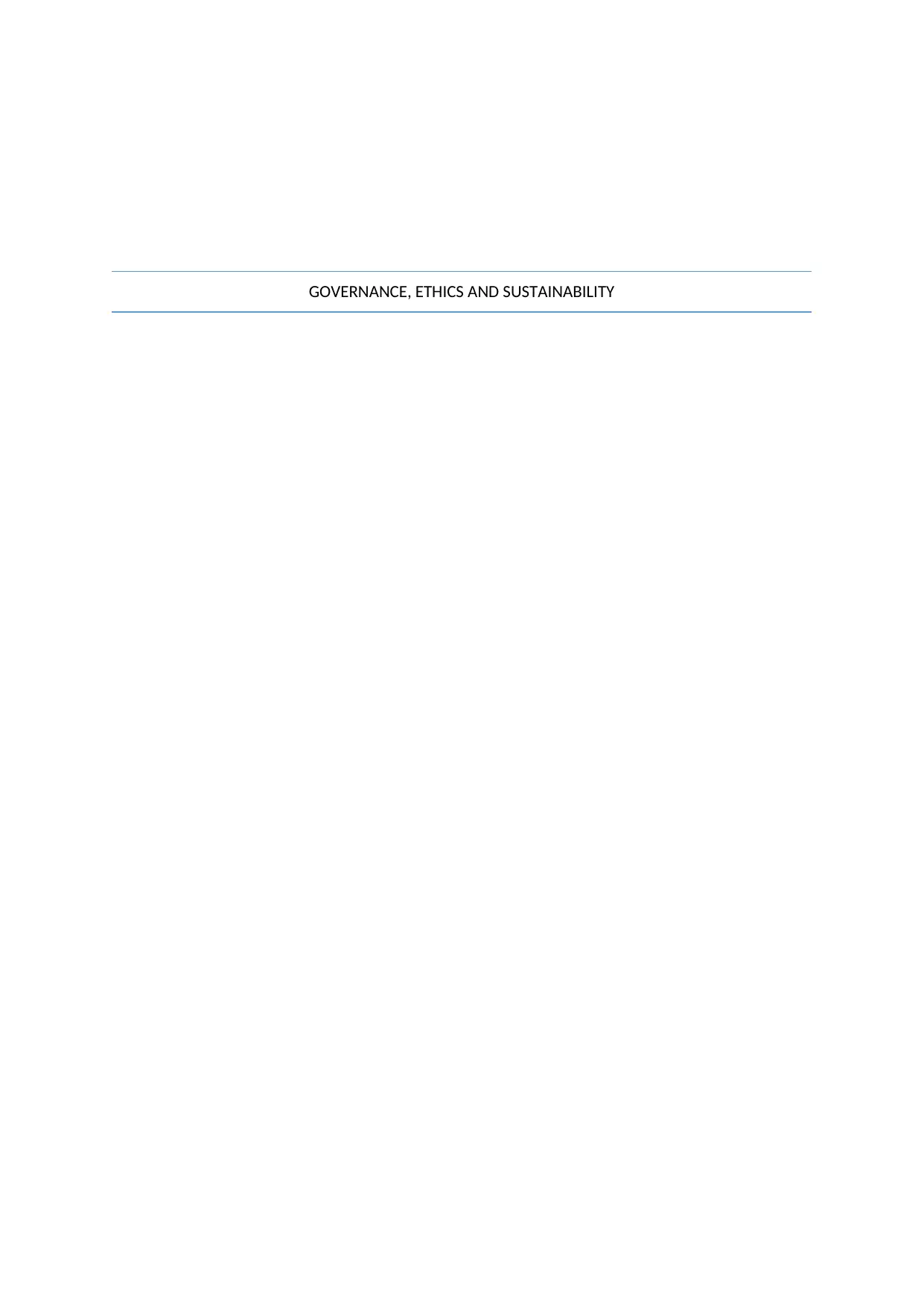
GOVERNANCE, ETHICS AND SUSTAINABILITY
Paraphrase This Document
Need a fresh take? Get an instant paraphrase of this document with our AI Paraphraser
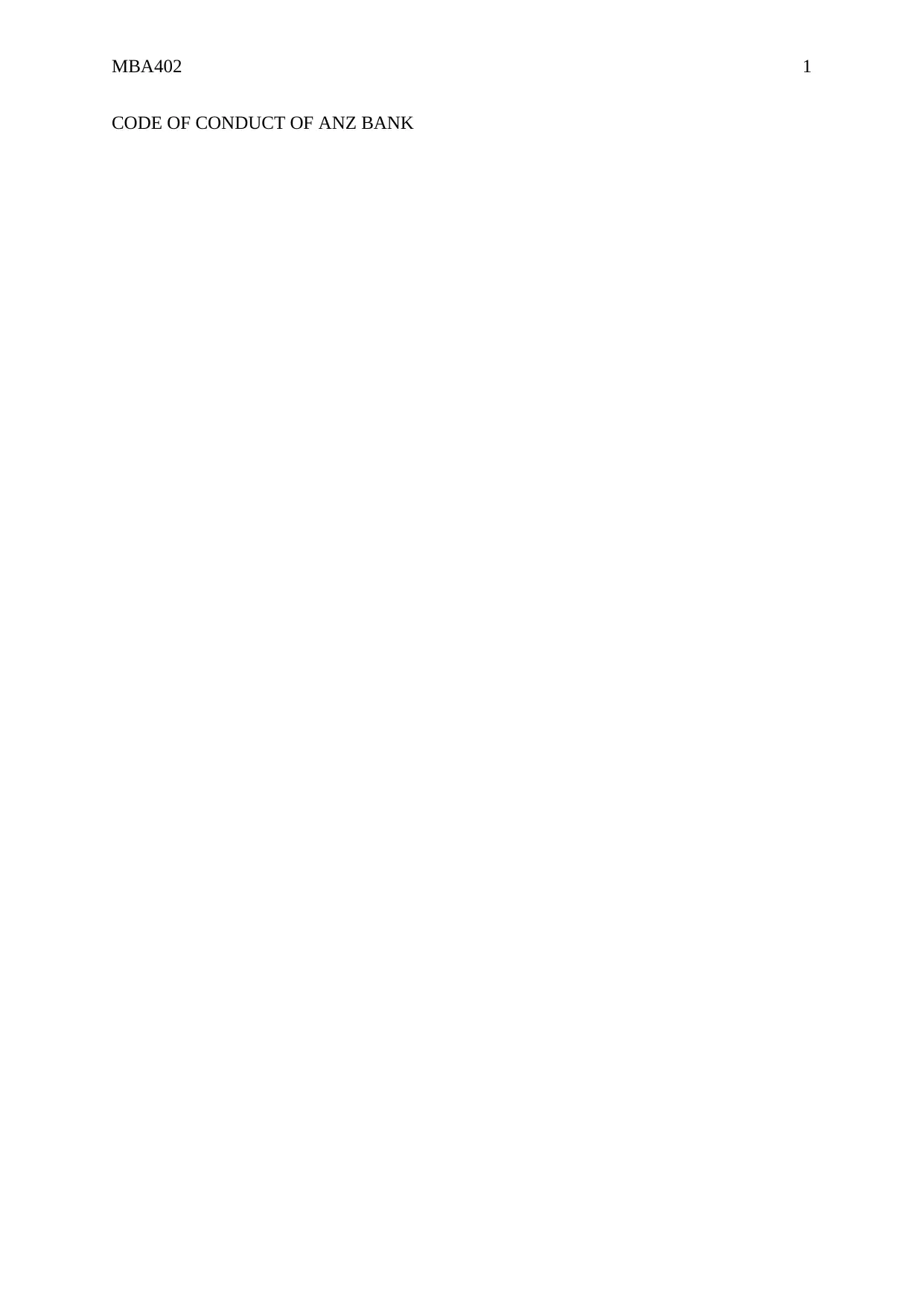
MBA402 1
CODE OF CONDUCT OF ANZ BANK
CODE OF CONDUCT OF ANZ BANK
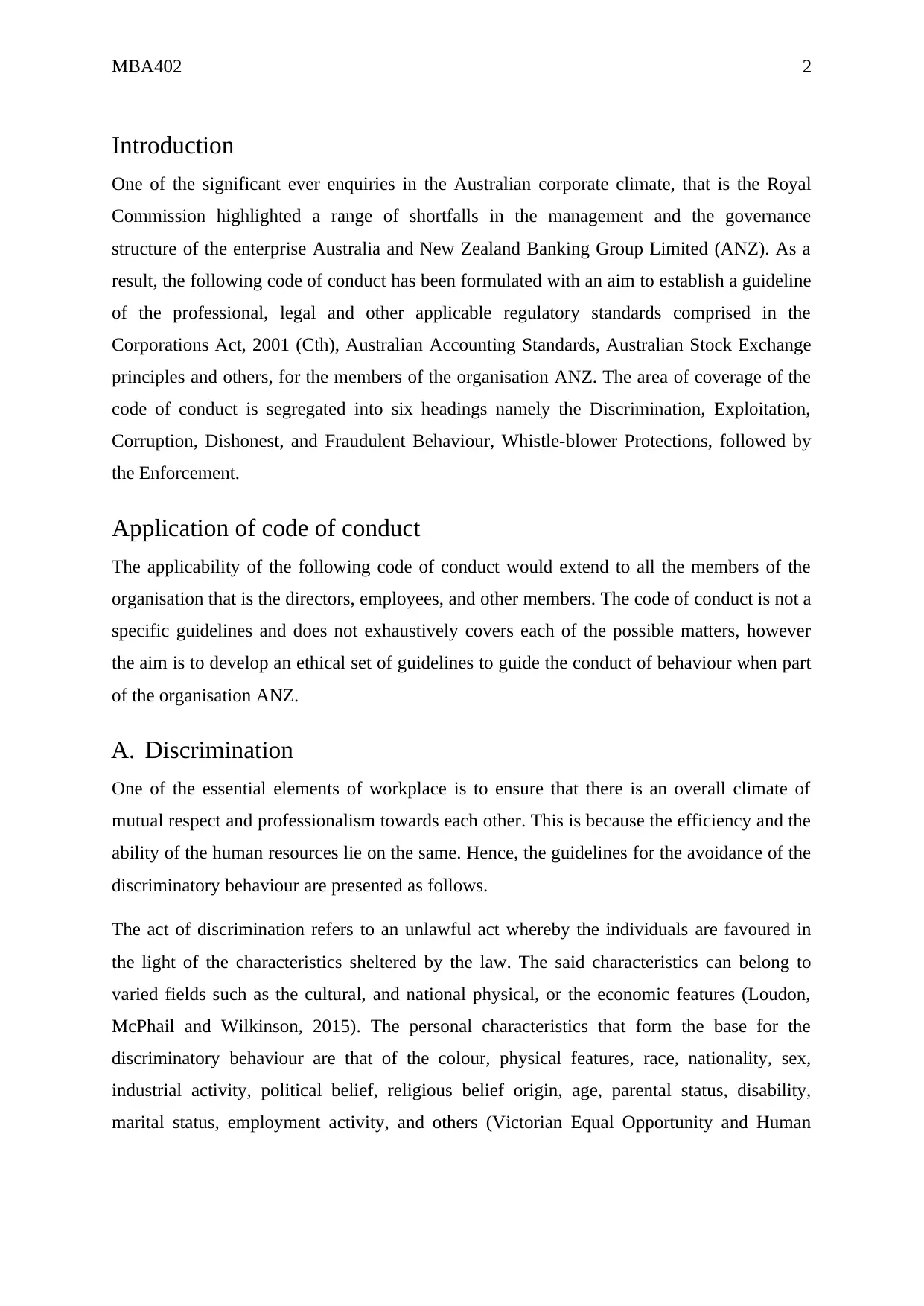
MBA402 2
Introduction
One of the significant ever enquiries in the Australian corporate climate, that is the Royal
Commission highlighted a range of shortfalls in the management and the governance
structure of the enterprise Australia and New Zealand Banking Group Limited (ANZ). As a
result, the following code of conduct has been formulated with an aim to establish a guideline
of the professional, legal and other applicable regulatory standards comprised in the
Corporations Act, 2001 (Cth), Australian Accounting Standards, Australian Stock Exchange
principles and others, for the members of the organisation ANZ. The area of coverage of the
code of conduct is segregated into six headings namely the Discrimination, Exploitation,
Corruption, Dishonest, and Fraudulent Behaviour, Whistle-blower Protections, followed by
the Enforcement.
Application of code of conduct
The applicability of the following code of conduct would extend to all the members of the
organisation that is the directors, employees, and other members. The code of conduct is not a
specific guidelines and does not exhaustively covers each of the possible matters, however
the aim is to develop an ethical set of guidelines to guide the conduct of behaviour when part
of the organisation ANZ.
A. Discrimination
One of the essential elements of workplace is to ensure that there is an overall climate of
mutual respect and professionalism towards each other. This is because the efficiency and the
ability of the human resources lie on the same. Hence, the guidelines for the avoidance of the
discriminatory behaviour are presented as follows.
The act of discrimination refers to an unlawful act whereby the individuals are favoured in
the light of the characteristics sheltered by the law. The said characteristics can belong to
varied fields such as the cultural, and national physical, or the economic features (Loudon,
McPhail and Wilkinson, 2015). The personal characteristics that form the base for the
discriminatory behaviour are that of the colour, physical features, race, nationality, sex,
industrial activity, political belief, religious belief origin, age, parental status, disability,
marital status, employment activity, and others (Victorian Equal Opportunity and Human
Introduction
One of the significant ever enquiries in the Australian corporate climate, that is the Royal
Commission highlighted a range of shortfalls in the management and the governance
structure of the enterprise Australia and New Zealand Banking Group Limited (ANZ). As a
result, the following code of conduct has been formulated with an aim to establish a guideline
of the professional, legal and other applicable regulatory standards comprised in the
Corporations Act, 2001 (Cth), Australian Accounting Standards, Australian Stock Exchange
principles and others, for the members of the organisation ANZ. The area of coverage of the
code of conduct is segregated into six headings namely the Discrimination, Exploitation,
Corruption, Dishonest, and Fraudulent Behaviour, Whistle-blower Protections, followed by
the Enforcement.
Application of code of conduct
The applicability of the following code of conduct would extend to all the members of the
organisation that is the directors, employees, and other members. The code of conduct is not a
specific guidelines and does not exhaustively covers each of the possible matters, however
the aim is to develop an ethical set of guidelines to guide the conduct of behaviour when part
of the organisation ANZ.
A. Discrimination
One of the essential elements of workplace is to ensure that there is an overall climate of
mutual respect and professionalism towards each other. This is because the efficiency and the
ability of the human resources lie on the same. Hence, the guidelines for the avoidance of the
discriminatory behaviour are presented as follows.
The act of discrimination refers to an unlawful act whereby the individuals are favoured in
the light of the characteristics sheltered by the law. The said characteristics can belong to
varied fields such as the cultural, and national physical, or the economic features (Loudon,
McPhail and Wilkinson, 2015). The personal characteristics that form the base for the
discriminatory behaviour are that of the colour, physical features, race, nationality, sex,
industrial activity, political belief, religious belief origin, age, parental status, disability,
marital status, employment activity, and others (Victorian Equal Opportunity and Human
⊘ This is a preview!⊘
Do you want full access?
Subscribe today to unlock all pages.

Trusted by 1+ million students worldwide
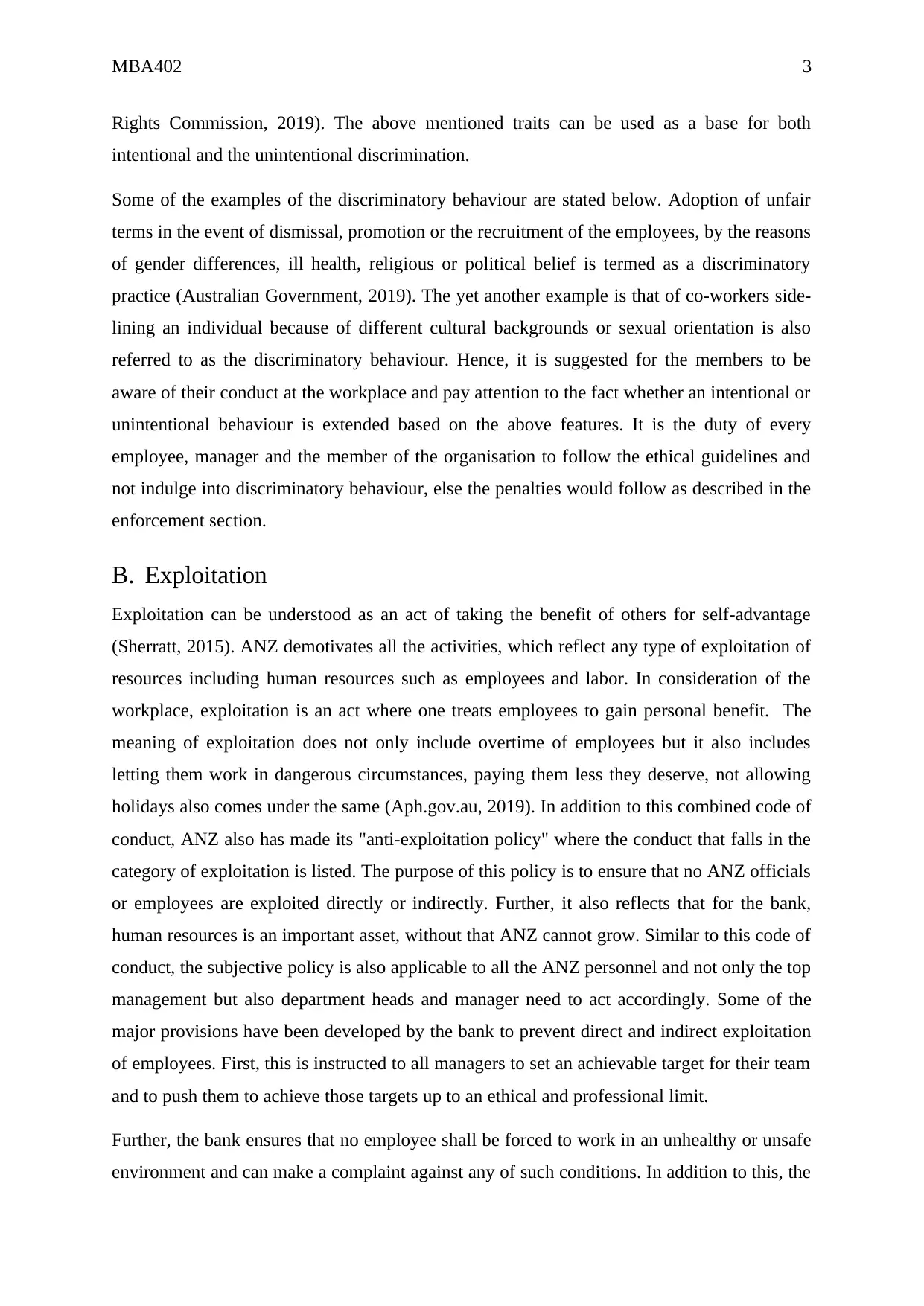
MBA402 3
Rights Commission, 2019). The above mentioned traits can be used as a base for both
intentional and the unintentional discrimination.
Some of the examples of the discriminatory behaviour are stated below. Adoption of unfair
terms in the event of dismissal, promotion or the recruitment of the employees, by the reasons
of gender differences, ill health, religious or political belief is termed as a discriminatory
practice (Australian Government, 2019). The yet another example is that of co-workers side-
lining an individual because of different cultural backgrounds or sexual orientation is also
referred to as the discriminatory behaviour. Hence, it is suggested for the members to be
aware of their conduct at the workplace and pay attention to the fact whether an intentional or
unintentional behaviour is extended based on the above features. It is the duty of every
employee, manager and the member of the organisation to follow the ethical guidelines and
not indulge into discriminatory behaviour, else the penalties would follow as described in the
enforcement section.
B. Exploitation
Exploitation can be understood as an act of taking the benefit of others for self-advantage
(Sherratt, 2015). ANZ demotivates all the activities, which reflect any type of exploitation of
resources including human resources such as employees and labor. In consideration of the
workplace, exploitation is an act where one treats employees to gain personal benefit. The
meaning of exploitation does not only include overtime of employees but it also includes
letting them work in dangerous circumstances, paying them less they deserve, not allowing
holidays also comes under the same (Aph.gov.au, 2019). In addition to this combined code of
conduct, ANZ also has made its "anti-exploitation policy" where the conduct that falls in the
category of exploitation is listed. The purpose of this policy is to ensure that no ANZ officials
or employees are exploited directly or indirectly. Further, it also reflects that for the bank,
human resources is an important asset, without that ANZ cannot grow. Similar to this code of
conduct, the subjective policy is also applicable to all the ANZ personnel and not only the top
management but also department heads and manager need to act accordingly. Some of the
major provisions have been developed by the bank to prevent direct and indirect exploitation
of employees. First, this is instructed to all managers to set an achievable target for their team
and to push them to achieve those targets up to an ethical and professional limit.
Further, the bank ensures that no employee shall be forced to work in an unhealthy or unsafe
environment and can make a complaint against any of such conditions. In addition to this, the
Rights Commission, 2019). The above mentioned traits can be used as a base for both
intentional and the unintentional discrimination.
Some of the examples of the discriminatory behaviour are stated below. Adoption of unfair
terms in the event of dismissal, promotion or the recruitment of the employees, by the reasons
of gender differences, ill health, religious or political belief is termed as a discriminatory
practice (Australian Government, 2019). The yet another example is that of co-workers side-
lining an individual because of different cultural backgrounds or sexual orientation is also
referred to as the discriminatory behaviour. Hence, it is suggested for the members to be
aware of their conduct at the workplace and pay attention to the fact whether an intentional or
unintentional behaviour is extended based on the above features. It is the duty of every
employee, manager and the member of the organisation to follow the ethical guidelines and
not indulge into discriminatory behaviour, else the penalties would follow as described in the
enforcement section.
B. Exploitation
Exploitation can be understood as an act of taking the benefit of others for self-advantage
(Sherratt, 2015). ANZ demotivates all the activities, which reflect any type of exploitation of
resources including human resources such as employees and labor. In consideration of the
workplace, exploitation is an act where one treats employees to gain personal benefit. The
meaning of exploitation does not only include overtime of employees but it also includes
letting them work in dangerous circumstances, paying them less they deserve, not allowing
holidays also comes under the same (Aph.gov.au, 2019). In addition to this combined code of
conduct, ANZ also has made its "anti-exploitation policy" where the conduct that falls in the
category of exploitation is listed. The purpose of this policy is to ensure that no ANZ officials
or employees are exploited directly or indirectly. Further, it also reflects that for the bank,
human resources is an important asset, without that ANZ cannot grow. Similar to this code of
conduct, the subjective policy is also applicable to all the ANZ personnel and not only the top
management but also department heads and manager need to act accordingly. Some of the
major provisions have been developed by the bank to prevent direct and indirect exploitation
of employees. First, this is instructed to all managers to set an achievable target for their team
and to push them to achieve those targets up to an ethical and professional limit.
Further, the bank ensures that no employee shall be forced to work in an unhealthy or unsafe
environment and can make a complaint against any of such conditions. In addition to this, the
Paraphrase This Document
Need a fresh take? Get an instant paraphrase of this document with our AI Paraphraser
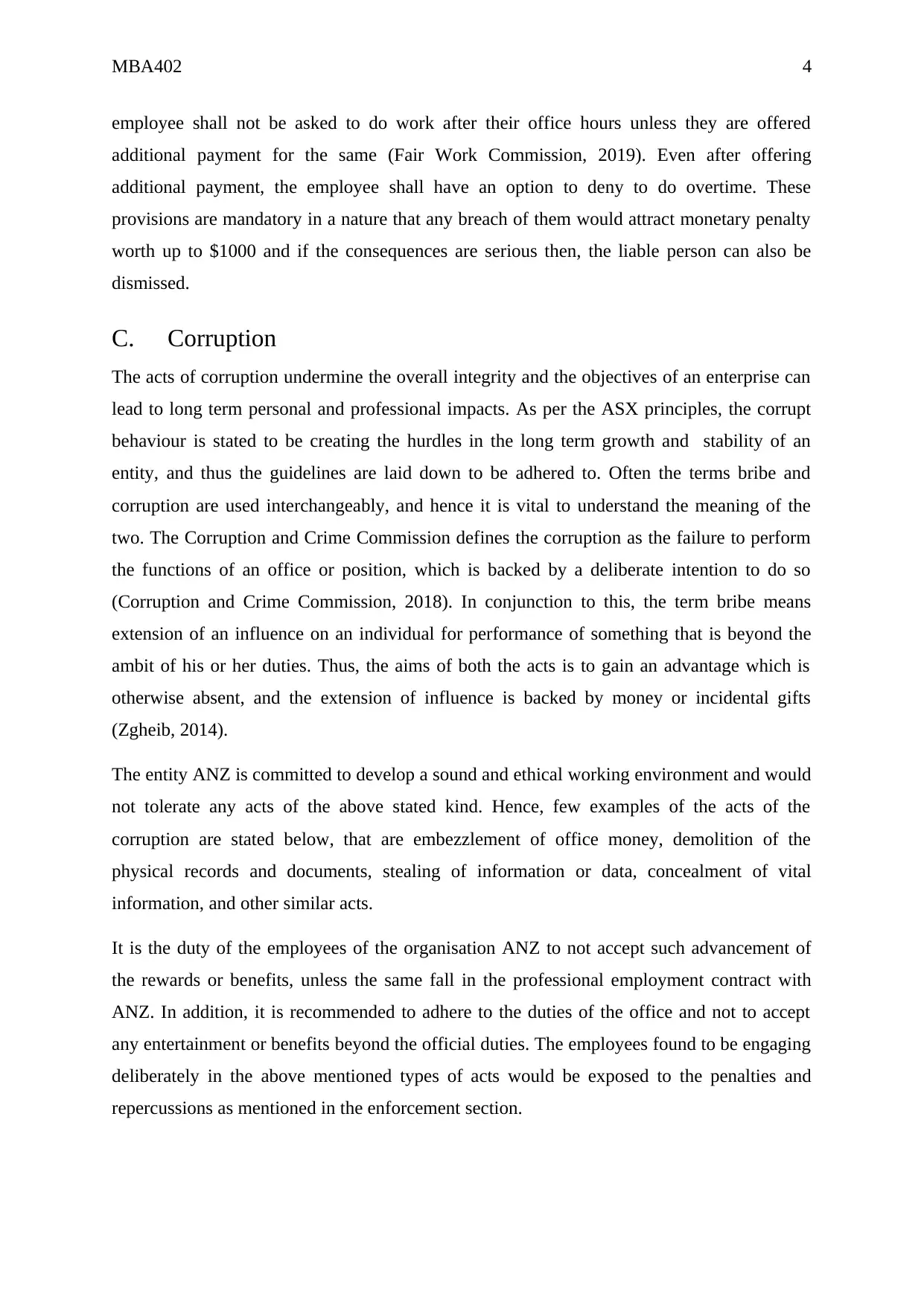
MBA402 4
employee shall not be asked to do work after their office hours unless they are offered
additional payment for the same (Fair Work Commission, 2019). Even after offering
additional payment, the employee shall have an option to deny to do overtime. These
provisions are mandatory in a nature that any breach of them would attract monetary penalty
worth up to $1000 and if the consequences are serious then, the liable person can also be
dismissed.
C. Corruption
The acts of corruption undermine the overall integrity and the objectives of an enterprise can
lead to long term personal and professional impacts. As per the ASX principles, the corrupt
behaviour is stated to be creating the hurdles in the long term growth and stability of an
entity, and thus the guidelines are laid down to be adhered to. Often the terms bribe and
corruption are used interchangeably, and hence it is vital to understand the meaning of the
two. The Corruption and Crime Commission defines the corruption as the failure to perform
the functions of an office or position, which is backed by a deliberate intention to do so
(Corruption and Crime Commission, 2018). In conjunction to this, the term bribe means
extension of an influence on an individual for performance of something that is beyond the
ambit of his or her duties. Thus, the aims of both the acts is to gain an advantage which is
otherwise absent, and the extension of influence is backed by money or incidental gifts
(Zgheib, 2014).
The entity ANZ is committed to develop a sound and ethical working environment and would
not tolerate any acts of the above stated kind. Hence, few examples of the acts of the
corruption are stated below, that are embezzlement of office money, demolition of the
physical records and documents, stealing of information or data, concealment of vital
information, and other similar acts.
It is the duty of the employees of the organisation ANZ to not accept such advancement of
the rewards or benefits, unless the same fall in the professional employment contract with
ANZ. In addition, it is recommended to adhere to the duties of the office and not to accept
any entertainment or benefits beyond the official duties. The employees found to be engaging
deliberately in the above mentioned types of acts would be exposed to the penalties and
repercussions as mentioned in the enforcement section.
employee shall not be asked to do work after their office hours unless they are offered
additional payment for the same (Fair Work Commission, 2019). Even after offering
additional payment, the employee shall have an option to deny to do overtime. These
provisions are mandatory in a nature that any breach of them would attract monetary penalty
worth up to $1000 and if the consequences are serious then, the liable person can also be
dismissed.
C. Corruption
The acts of corruption undermine the overall integrity and the objectives of an enterprise can
lead to long term personal and professional impacts. As per the ASX principles, the corrupt
behaviour is stated to be creating the hurdles in the long term growth and stability of an
entity, and thus the guidelines are laid down to be adhered to. Often the terms bribe and
corruption are used interchangeably, and hence it is vital to understand the meaning of the
two. The Corruption and Crime Commission defines the corruption as the failure to perform
the functions of an office or position, which is backed by a deliberate intention to do so
(Corruption and Crime Commission, 2018). In conjunction to this, the term bribe means
extension of an influence on an individual for performance of something that is beyond the
ambit of his or her duties. Thus, the aims of both the acts is to gain an advantage which is
otherwise absent, and the extension of influence is backed by money or incidental gifts
(Zgheib, 2014).
The entity ANZ is committed to develop a sound and ethical working environment and would
not tolerate any acts of the above stated kind. Hence, few examples of the acts of the
corruption are stated below, that are embezzlement of office money, demolition of the
physical records and documents, stealing of information or data, concealment of vital
information, and other similar acts.
It is the duty of the employees of the organisation ANZ to not accept such advancement of
the rewards or benefits, unless the same fall in the professional employment contract with
ANZ. In addition, it is recommended to adhere to the duties of the office and not to accept
any entertainment or benefits beyond the official duties. The employees found to be engaging
deliberately in the above mentioned types of acts would be exposed to the penalties and
repercussions as mentioned in the enforcement section.
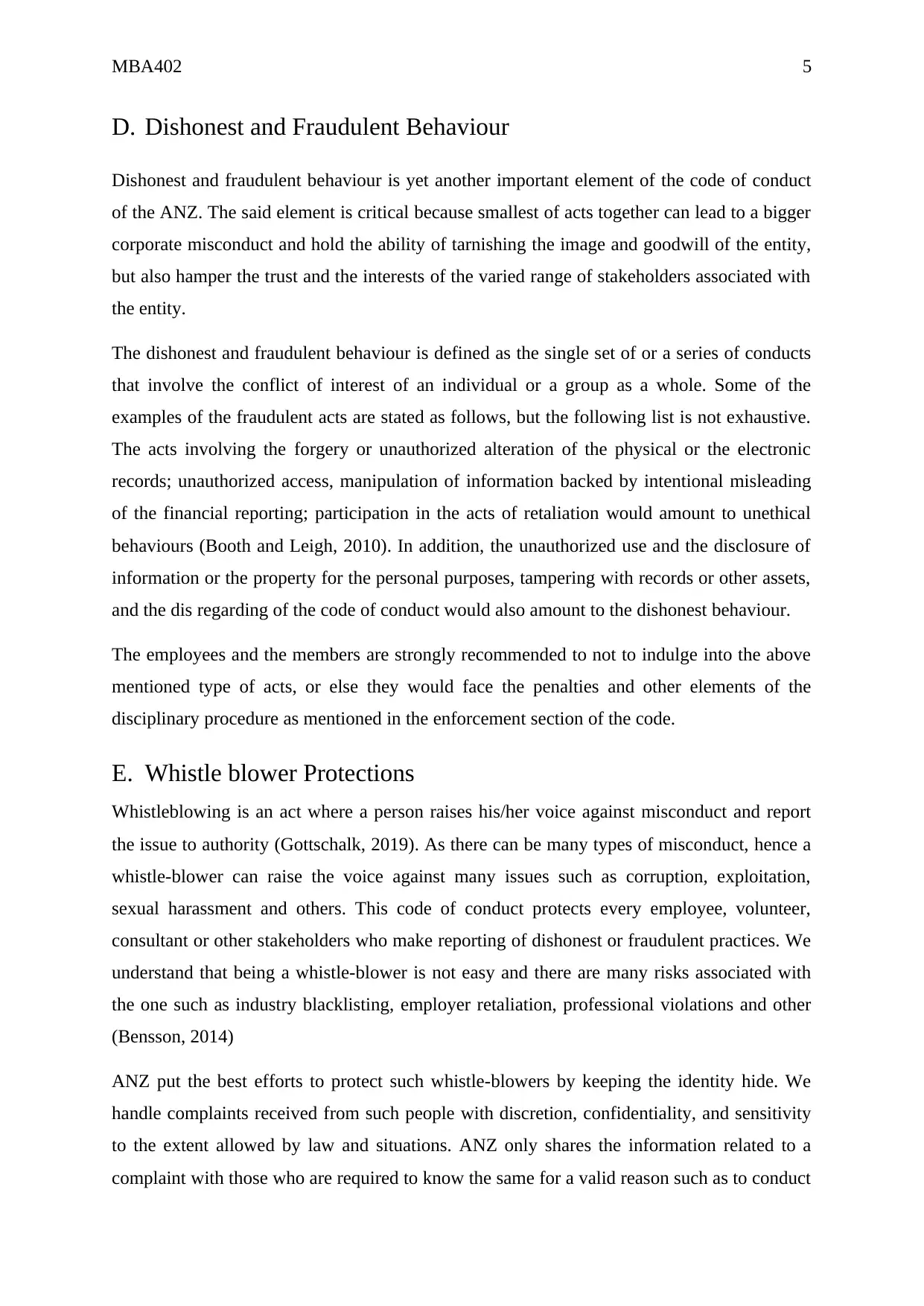
MBA402 5
D. Dishonest and Fraudulent Behaviour
Dishonest and fraudulent behaviour is yet another important element of the code of conduct
of the ANZ. The said element is critical because smallest of acts together can lead to a bigger
corporate misconduct and hold the ability of tarnishing the image and goodwill of the entity,
but also hamper the trust and the interests of the varied range of stakeholders associated with
the entity.
The dishonest and fraudulent behaviour is defined as the single set of or a series of conducts
that involve the conflict of interest of an individual or a group as a whole. Some of the
examples of the fraudulent acts are stated as follows, but the following list is not exhaustive.
The acts involving the forgery or unauthorized alteration of the physical or the electronic
records; unauthorized access, manipulation of information backed by intentional misleading
of the financial reporting; participation in the acts of retaliation would amount to unethical
behaviours (Booth and Leigh, 2010). In addition, the unauthorized use and the disclosure of
information or the property for the personal purposes, tampering with records or other assets,
and the dis regarding of the code of conduct would also amount to the dishonest behaviour.
The employees and the members are strongly recommended to not to indulge into the above
mentioned type of acts, or else they would face the penalties and other elements of the
disciplinary procedure as mentioned in the enforcement section of the code.
E. Whistle blower Protections
Whistleblowing is an act where a person raises his/her voice against misconduct and report
the issue to authority (Gottschalk, 2019). As there can be many types of misconduct, hence a
whistle-blower can raise the voice against many issues such as corruption, exploitation,
sexual harassment and others. This code of conduct protects every employee, volunteer,
consultant or other stakeholders who make reporting of dishonest or fraudulent practices. We
understand that being a whistle-blower is not easy and there are many risks associated with
the one such as industry blacklisting, employer retaliation, professional violations and other
(Bensson, 2014)
ANZ put the best efforts to protect such whistle-blowers by keeping the identity hide. We
handle complaints received from such people with discretion, confidentiality, and sensitivity
to the extent allowed by law and situations. ANZ only shares the information related to a
complaint with those who are required to know the same for a valid reason such as to conduct
D. Dishonest and Fraudulent Behaviour
Dishonest and fraudulent behaviour is yet another important element of the code of conduct
of the ANZ. The said element is critical because smallest of acts together can lead to a bigger
corporate misconduct and hold the ability of tarnishing the image and goodwill of the entity,
but also hamper the trust and the interests of the varied range of stakeholders associated with
the entity.
The dishonest and fraudulent behaviour is defined as the single set of or a series of conducts
that involve the conflict of interest of an individual or a group as a whole. Some of the
examples of the fraudulent acts are stated as follows, but the following list is not exhaustive.
The acts involving the forgery or unauthorized alteration of the physical or the electronic
records; unauthorized access, manipulation of information backed by intentional misleading
of the financial reporting; participation in the acts of retaliation would amount to unethical
behaviours (Booth and Leigh, 2010). In addition, the unauthorized use and the disclosure of
information or the property for the personal purposes, tampering with records or other assets,
and the dis regarding of the code of conduct would also amount to the dishonest behaviour.
The employees and the members are strongly recommended to not to indulge into the above
mentioned type of acts, or else they would face the penalties and other elements of the
disciplinary procedure as mentioned in the enforcement section of the code.
E. Whistle blower Protections
Whistleblowing is an act where a person raises his/her voice against misconduct and report
the issue to authority (Gottschalk, 2019). As there can be many types of misconduct, hence a
whistle-blower can raise the voice against many issues such as corruption, exploitation,
sexual harassment and others. This code of conduct protects every employee, volunteer,
consultant or other stakeholders who make reporting of dishonest or fraudulent practices. We
understand that being a whistle-blower is not easy and there are many risks associated with
the one such as industry blacklisting, employer retaliation, professional violations and other
(Bensson, 2014)
ANZ put the best efforts to protect such whistle-blowers by keeping the identity hide. We
handle complaints received from such people with discretion, confidentiality, and sensitivity
to the extent allowed by law and situations. ANZ only shares the information related to a
complaint with those who are required to know the same for a valid reason such as to conduct
⊘ This is a preview!⊘
Do you want full access?
Subscribe today to unlock all pages.

Trusted by 1+ million students worldwide
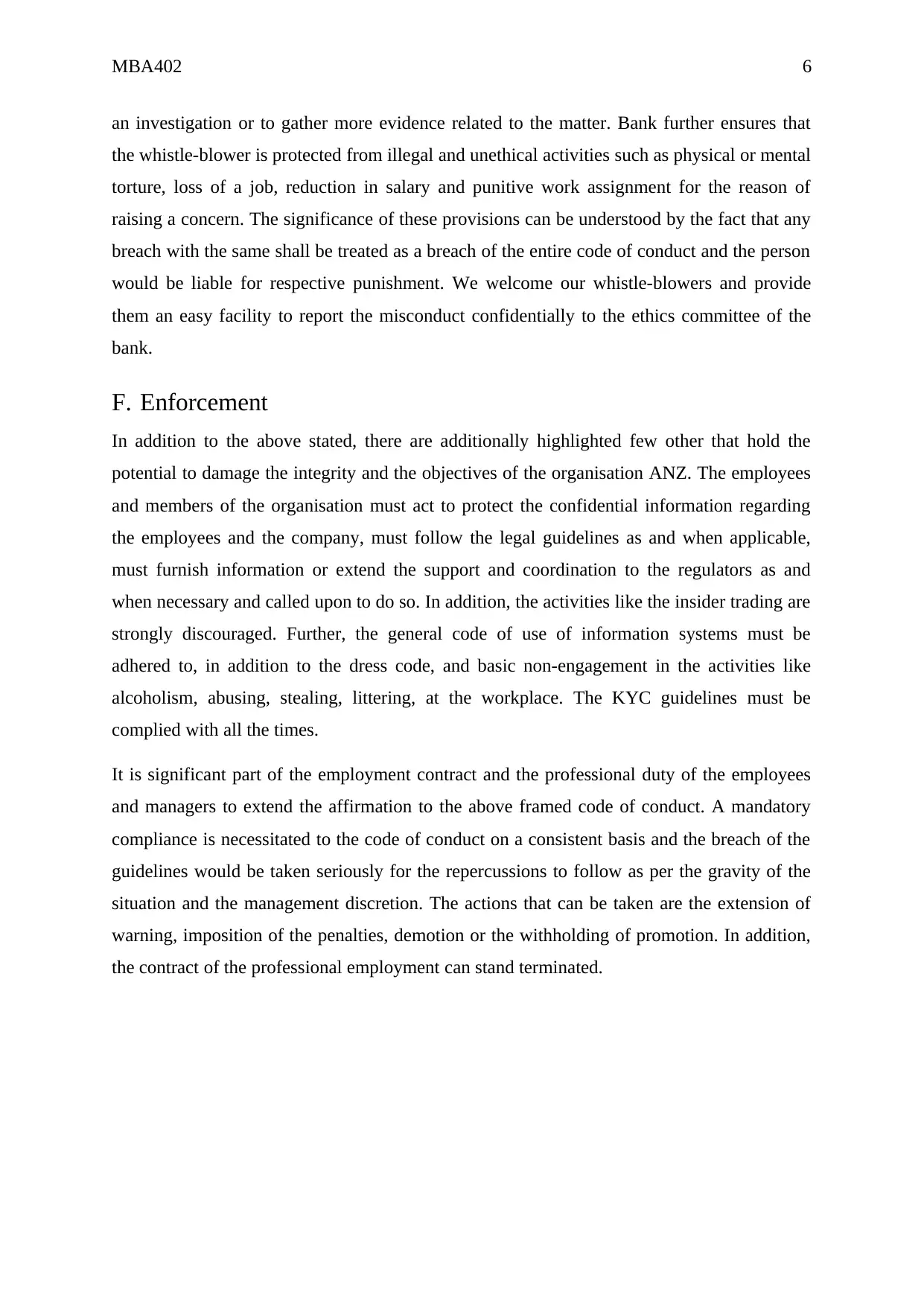
MBA402 6
an investigation or to gather more evidence related to the matter. Bank further ensures that
the whistle-blower is protected from illegal and unethical activities such as physical or mental
torture, loss of a job, reduction in salary and punitive work assignment for the reason of
raising a concern. The significance of these provisions can be understood by the fact that any
breach with the same shall be treated as a breach of the entire code of conduct and the person
would be liable for respective punishment. We welcome our whistle-blowers and provide
them an easy facility to report the misconduct confidentially to the ethics committee of the
bank.
F. Enforcement
In addition to the above stated, there are additionally highlighted few other that hold the
potential to damage the integrity and the objectives of the organisation ANZ. The employees
and members of the organisation must act to protect the confidential information regarding
the employees and the company, must follow the legal guidelines as and when applicable,
must furnish information or extend the support and coordination to the regulators as and
when necessary and called upon to do so. In addition, the activities like the insider trading are
strongly discouraged. Further, the general code of use of information systems must be
adhered to, in addition to the dress code, and basic non-engagement in the activities like
alcoholism, abusing, stealing, littering, at the workplace. The KYC guidelines must be
complied with all the times.
It is significant part of the employment contract and the professional duty of the employees
and managers to extend the affirmation to the above framed code of conduct. A mandatory
compliance is necessitated to the code of conduct on a consistent basis and the breach of the
guidelines would be taken seriously for the repercussions to follow as per the gravity of the
situation and the management discretion. The actions that can be taken are the extension of
warning, imposition of the penalties, demotion or the withholding of promotion. In addition,
the contract of the professional employment can stand terminated.
an investigation or to gather more evidence related to the matter. Bank further ensures that
the whistle-blower is protected from illegal and unethical activities such as physical or mental
torture, loss of a job, reduction in salary and punitive work assignment for the reason of
raising a concern. The significance of these provisions can be understood by the fact that any
breach with the same shall be treated as a breach of the entire code of conduct and the person
would be liable for respective punishment. We welcome our whistle-blowers and provide
them an easy facility to report the misconduct confidentially to the ethics committee of the
bank.
F. Enforcement
In addition to the above stated, there are additionally highlighted few other that hold the
potential to damage the integrity and the objectives of the organisation ANZ. The employees
and members of the organisation must act to protect the confidential information regarding
the employees and the company, must follow the legal guidelines as and when applicable,
must furnish information or extend the support and coordination to the regulators as and
when necessary and called upon to do so. In addition, the activities like the insider trading are
strongly discouraged. Further, the general code of use of information systems must be
adhered to, in addition to the dress code, and basic non-engagement in the activities like
alcoholism, abusing, stealing, littering, at the workplace. The KYC guidelines must be
complied with all the times.
It is significant part of the employment contract and the professional duty of the employees
and managers to extend the affirmation to the above framed code of conduct. A mandatory
compliance is necessitated to the code of conduct on a consistent basis and the breach of the
guidelines would be taken seriously for the repercussions to follow as per the gravity of the
situation and the management discretion. The actions that can be taken are the extension of
warning, imposition of the penalties, demotion or the withholding of promotion. In addition,
the contract of the professional employment can stand terminated.
Paraphrase This Document
Need a fresh take? Get an instant paraphrase of this document with our AI Paraphraser
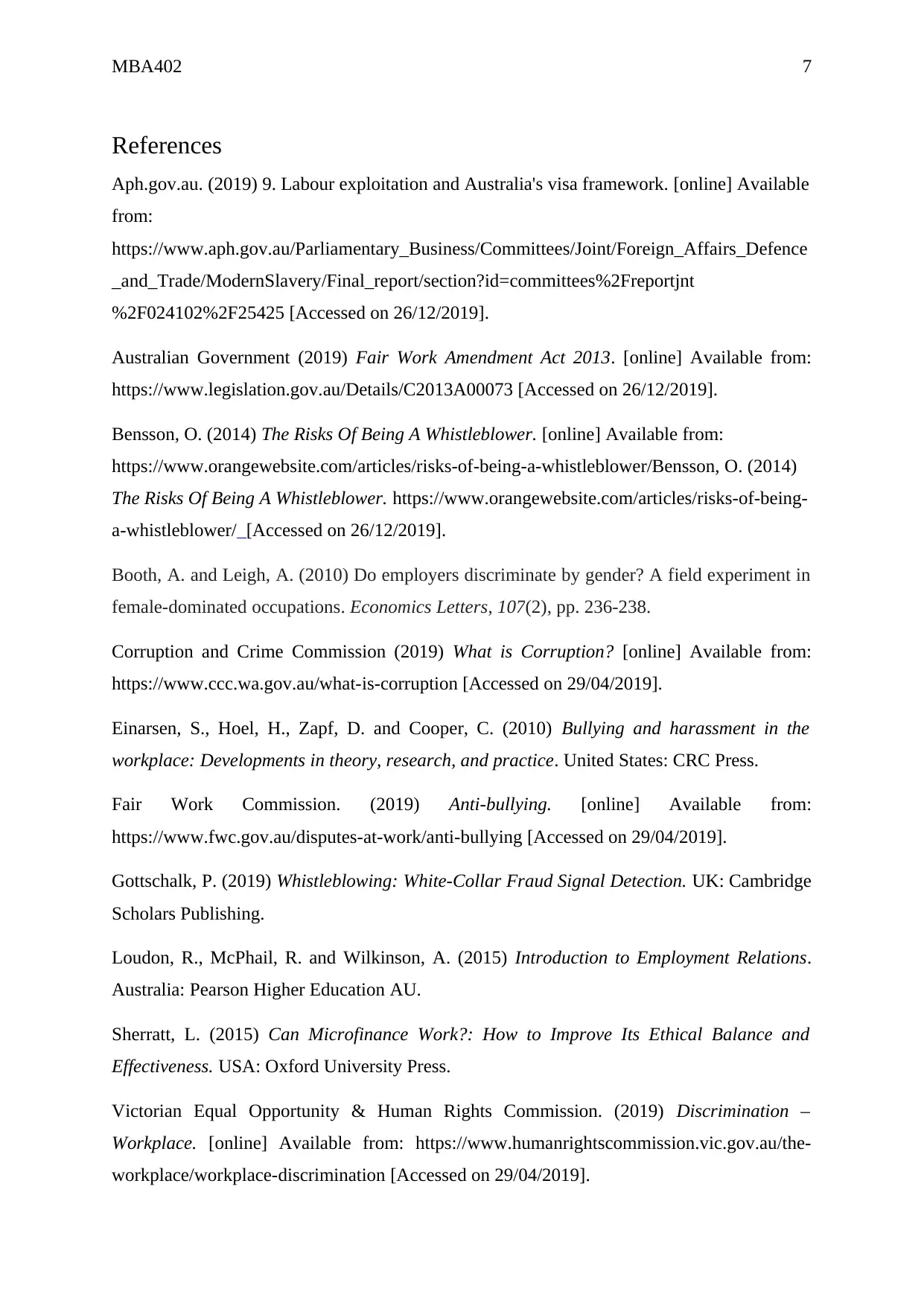
MBA402 7
References
Aph.gov.au. (2019) 9. Labour exploitation and Australia's visa framework. [online] Available
from:
https://www.aph.gov.au/Parliamentary_Business/Committees/Joint/Foreign_Affairs_Defence
_and_Trade/ModernSlavery/Final_report/section?id=committees%2Freportjnt
%2F024102%2F25425 [Accessed on 26/12/2019].
Australian Government (2019) Fair Work Amendment Act 2013. [online] Available from:
https://www.legislation.gov.au/Details/C2013A00073 [Accessed on 26/12/2019].
Bensson, O. (2014) The Risks Of Being A Whistleblower. [online] Available from:
https://www.orangewebsite.com/articles/risks-of-being-a-whistleblower/Bensson, O. (2014)
The Risks Of Being A Whistleblower. https://www.orangewebsite.com/articles/risks-of-being-
a-whistleblower/ [Accessed on 26/12/2019].
Booth, A. and Leigh, A. (2010) Do employers discriminate by gender? A field experiment in
female-dominated occupations. Economics Letters, 107(2), pp. 236-238.
Corruption and Crime Commission (2019) What is Corruption? [online] Available from:
https://www.ccc.wa.gov.au/what-is-corruption [Accessed on 29/04/2019].
Einarsen, S., Hoel, H., Zapf, D. and Cooper, C. (2010) Bullying and harassment in the
workplace: Developments in theory, research, and practice. United States: CRC Press.
Fair Work Commission. (2019) Anti-bullying. [online] Available from:
https://www.fwc.gov.au/disputes-at-work/anti-bullying [Accessed on 29/04/2019].
Gottschalk, P. (2019) Whistleblowing: White-Collar Fraud Signal Detection. UK: Cambridge
Scholars Publishing.
Loudon, R., McPhail, R. and Wilkinson, A. (2015) Introduction to Employment Relations.
Australia: Pearson Higher Education AU.
Sherratt, L. (2015) Can Microfinance Work?: How to Improve Its Ethical Balance and
Effectiveness. USA: Oxford University Press.
Victorian Equal Opportunity & Human Rights Commission. (2019) Discrimination –
Workplace. [online] Available from: https://www.humanrightscommission.vic.gov.au/the-
workplace/workplace-discrimination [Accessed on 29/04/2019].
References
Aph.gov.au. (2019) 9. Labour exploitation and Australia's visa framework. [online] Available
from:
https://www.aph.gov.au/Parliamentary_Business/Committees/Joint/Foreign_Affairs_Defence
_and_Trade/ModernSlavery/Final_report/section?id=committees%2Freportjnt
%2F024102%2F25425 [Accessed on 26/12/2019].
Australian Government (2019) Fair Work Amendment Act 2013. [online] Available from:
https://www.legislation.gov.au/Details/C2013A00073 [Accessed on 26/12/2019].
Bensson, O. (2014) The Risks Of Being A Whistleblower. [online] Available from:
https://www.orangewebsite.com/articles/risks-of-being-a-whistleblower/Bensson, O. (2014)
The Risks Of Being A Whistleblower. https://www.orangewebsite.com/articles/risks-of-being-
a-whistleblower/ [Accessed on 26/12/2019].
Booth, A. and Leigh, A. (2010) Do employers discriminate by gender? A field experiment in
female-dominated occupations. Economics Letters, 107(2), pp. 236-238.
Corruption and Crime Commission (2019) What is Corruption? [online] Available from:
https://www.ccc.wa.gov.au/what-is-corruption [Accessed on 29/04/2019].
Einarsen, S., Hoel, H., Zapf, D. and Cooper, C. (2010) Bullying and harassment in the
workplace: Developments in theory, research, and practice. United States: CRC Press.
Fair Work Commission. (2019) Anti-bullying. [online] Available from:
https://www.fwc.gov.au/disputes-at-work/anti-bullying [Accessed on 29/04/2019].
Gottschalk, P. (2019) Whistleblowing: White-Collar Fraud Signal Detection. UK: Cambridge
Scholars Publishing.
Loudon, R., McPhail, R. and Wilkinson, A. (2015) Introduction to Employment Relations.
Australia: Pearson Higher Education AU.
Sherratt, L. (2015) Can Microfinance Work?: How to Improve Its Ethical Balance and
Effectiveness. USA: Oxford University Press.
Victorian Equal Opportunity & Human Rights Commission. (2019) Discrimination –
Workplace. [online] Available from: https://www.humanrightscommission.vic.gov.au/the-
workplace/workplace-discrimination [Accessed on 29/04/2019].
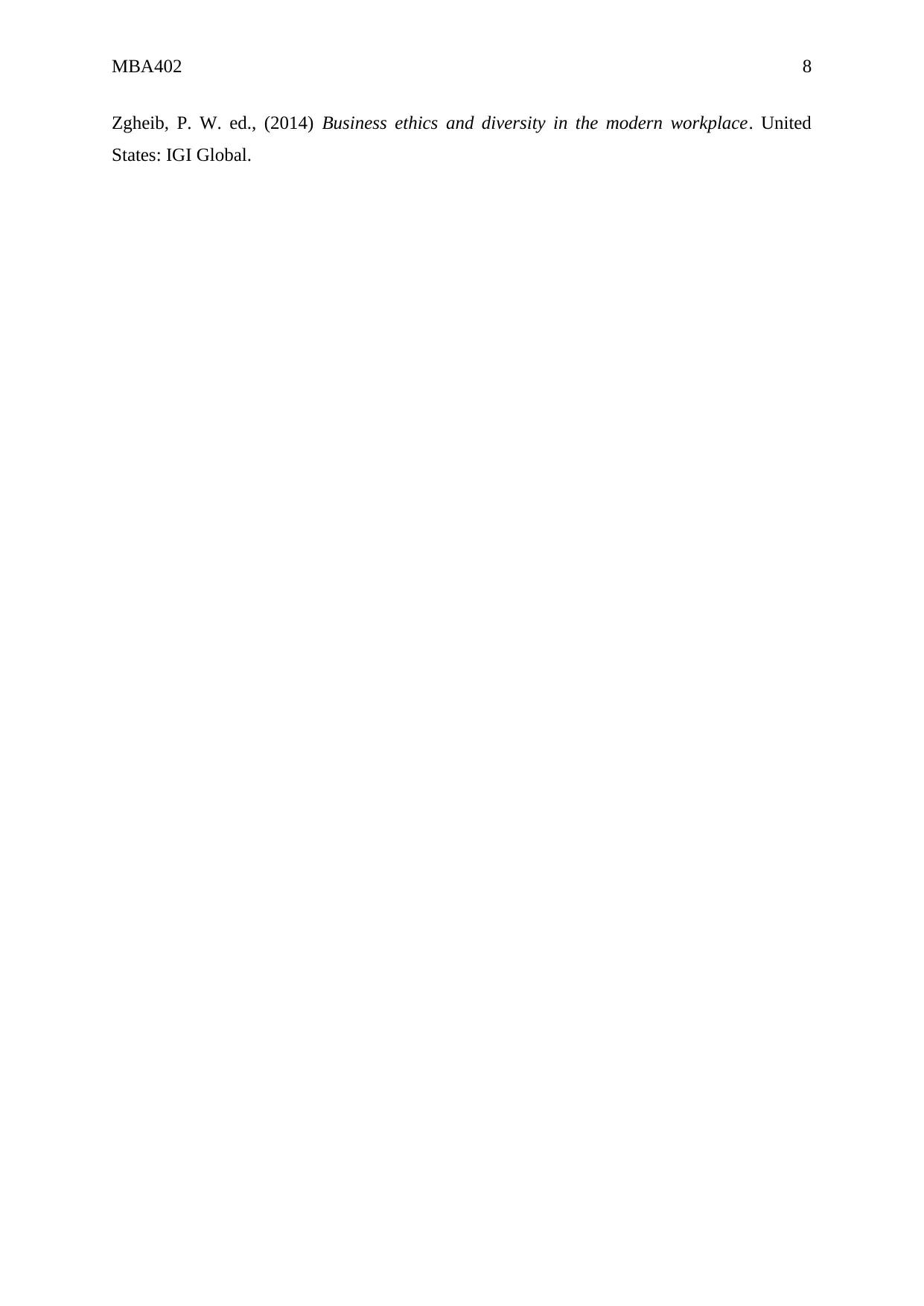
MBA402 8
Zgheib, P. W. ed., (2014) Business ethics and diversity in the modern workplace. United
States: IGI Global.
Zgheib, P. W. ed., (2014) Business ethics and diversity in the modern workplace. United
States: IGI Global.
⊘ This is a preview!⊘
Do you want full access?
Subscribe today to unlock all pages.

Trusted by 1+ million students worldwide
1 out of 9
Related Documents
Your All-in-One AI-Powered Toolkit for Academic Success.
+13062052269
info@desklib.com
Available 24*7 on WhatsApp / Email
![[object Object]](/_next/static/media/star-bottom.7253800d.svg)
Unlock your academic potential
Copyright © 2020–2026 A2Z Services. All Rights Reserved. Developed and managed by ZUCOL.





